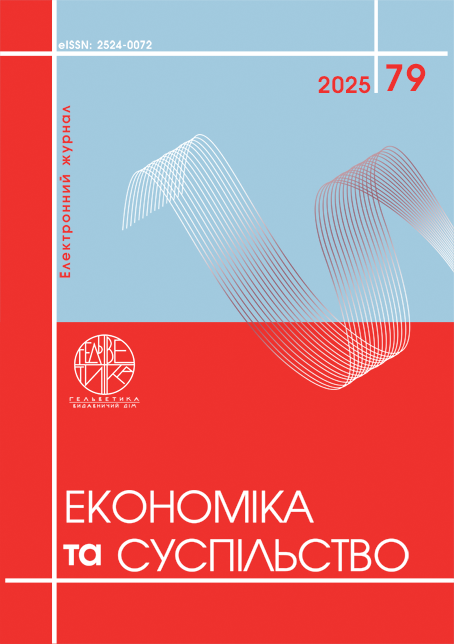THE ROLE OF DIGITAL TRANSFORMATION IN CUSTOMS MANAGEMENT
Abstract
The purpose of the article is to conduct a comprehensive study of the impact of digital technologies on the transformation of customs relations in the context of increasing the efficiency of customs administration, increasing the transparency of customs procedures and strengthening the economic security of the state. The relevance of this topic is determined by the accelerated pace of digitalization of foreign economic activity, the rapid development of international trade and the growing need for customs authorities to adapt their regulatory, procedural and analytical mechanisms to the realities of the modern digital environment. The study used system-analytical, comparative and structural-functional methods, which allowed us to identify the most significant areas of implementation of innovative technologies, such as artificial intelligence, blockchain systems, big data analytics and machine learning in customs operations. These methods allowed us to determine how technological solutions optimize control mechanisms, increase the reliability of data exchange and contribute to cross-border interoperability of customs information systems. The results of the study demonstrate that digital technologies have a transformative impact on the structure and functionality of customs administration, contributing to the automation of routine procedures, minimizing human errors, improving the risk management system and ensuring the integration of national customs systems into global supply chains. The implementation of digital platforms provides real-time monitoring of customs flows, reduces the time and cost of clearance, and increases the predictability and transparency of trade operations. The practical value of the article lies in the formulation of conceptual approaches to the development of a single digital strategy for customs authorities aimed at achieving a balance between security, transparency and efficiency of customs clearance processes. The results obtained can serve as a methodological basis for the modernization of customs administration and for further scientific research on the digital transformation of public administration in the field of international trade.
References
Цифрові детермінанти підвищення ефективності митного контролю: Десяті ювілейні всеукраїнські наукові читання пам'яті С. І. Юрія: збірник наукових праць. М. Тернопіль, 12 листопада 2024 р. с. 104.
Рум’янцева К.Є., Головай Н.М., Руденко В.В. Розвиток інформаційних технологій у митній сфері. Актуальні питання економічних наук. 2025. Вип.7 с. 5.
Ніколаєв С.О., Ковальов Б.Л., Гриценко П.В. Блокчейн як фактор цифрової трансформації економіки України. Вісник Сумського державного університету. Економіка 2021 р. с. 6.
Митний кодекс України від 13.03.2012 р. 4495-VI. Відомості Верховної Ради. URL: https://zakon.rada.gov.ua/laws/show/4495-17#Text (дата звернення 14.10.2025)
Розпорядження Кабінету Міністрів «Про розвиток системи управління ризиками у сфері митного контролю на період до 2022 року» від 27.12.2017 р. №978-р. Відомості Верховної Ради. URL: https://surli.cc/tthphl (дата звернення 14.10.2025)
Борса В.В., Теребийчик Ю.Р. Цифровізація митниці як чинник розвитку міжнародної торгівлі. Європейський науковий журнал Економічних та Фінансових інновацій. 2024. Том 2 №14.
Гребельник О. П., Пашко П. В., Шевчук С. В. та інші. Розвиток митної політики України в контексті реалізації економічної функції держави. Монографія. Ірпінь : Університет ДФС України, 2021. 266 с.
Tsyfrovi determinanty pidvyshchennia efektyvnosti mytnoho kontroliu. (2024). Desiati yuvileini vseukrainski naukovi chytannia pamiati S. I. Yuriia. [ Digital determinants of increasing the efficiency of customs control: Tenth anniversary all-Ukrainian scientific readings in memory of S. I. Yuriy]. Zbirnyk naukovykh prats- collection of scientific works (p. 104). Ternopil.
Rumiantseva K. Ye., Holovai N. M., Rudenko V. V. (2025). Rozvytok informatsiinykh tekhnolohii u mytnii sferi: aktualni pytannia ekonomichnykh nauk [Development of information technologies in the customs sphere: current issues of economic], (7), 5.
Nikolaiev S. O., Kovalov B. L., Hrytsenko P. V. (2021). Blokchein yak faktor tsyfrovoi transformatsii ekonomiky Ukrainy: visnyk Sumskoho derzhavnoho universytetu Ekonomika [Blockchain as a factor in the digital transformation of the economy of Ukraine: bulletin of Sumy State University Economics], 6.
Verkhovna Rada of Ukraine (2012), Customs Code of Ukraine, Law No. 4495-VI of 13 March 2012, available at: https://zakon.rada.gov.ua/laws/show/4495-17#Text (Accessed 5 October 2025).
Cabinet of Ministers of Ukraine. (2017), On the development of the risk management system in the field of customs control for the period up to 2022, Resolution No. 978-r of 27 December 2017,, available at: https://surli.cc/tthphl (Accessed 5 October 2025).
Borsa, V.V., Terebyichyk, Yu.R. (2024), Digitalization of customs as a factor in the development of international trade: european Scientific Journal of Economic and Financial Innovations [Customs digitalization as a factor in the development of international trade: european Scientific Journal of Economic and Financial Innovations], 2(14).
Hrebelnyk O.P., Pashko P.V., Shevchuk S.V. et al. (2021), Rozvytok mytnoi polityky Ukrainy v konteksti realizatsii ekonomichnoi funktsii derzhavy: monohrafiia [Development of Ukraine’s customs policy in the context of the state’s economic function: monograph], Irpin: University of the State Fiscal Service of Ukraine, 266 pp.

This work is licensed under a Creative Commons Attribution 4.0 International License.


